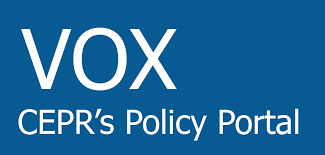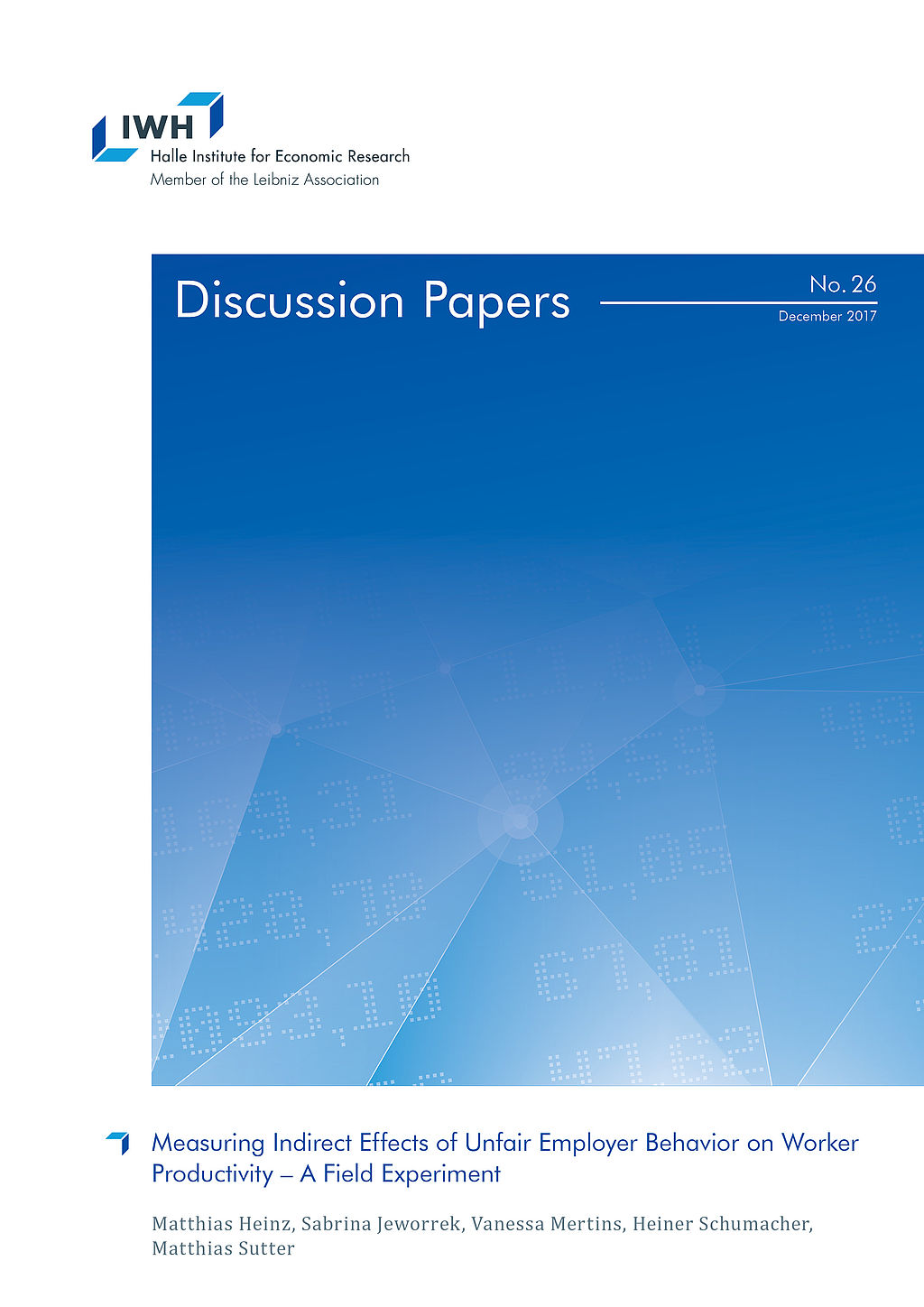Fairness pays off
What happens to one’s own productivity when a colleague experiences unfairness? As of yet, this indirect influence in the workplace has been the subject of very little study. Unfair behaviour by an employer makes employees less productive – even if those employees are not directly affected. This was demonstrated by IWH economist Sabrina Jeworrek and co-authors Matthias Heinz, Vanessa Mertins, Heiner Schumacher and Matthias Sutter in a behavioural economic experiment. The experiment simulated an unfair employer-employee situation: 195 subjects were hired for two work shifts in a call centre to carry out a nation-wide survey in Germany. The employees received 40 Euros per shift, paid at the beginning of both 3.5-hour shifts. Employees were randomly assigned to one of three groups during their assignment at the call centre to measure the indirect effect of unfair behaviour. In the first group, staff numbers remained unchanged in the second shift. In a second group, the staff were reduced by 20%, but the remaining employees were not informed that these were terminations. Rather, they were told that there would simply be fewer staff for the second shift. In the third group, the staff were also reduced by 20%, but the remaining employees were informed that the reductions were the result of terminations. “We also told the people in the third group that we fired their colleagues so we can cut costs, and that the selection of people was completely arbitrary. We wanted the situation to be as unfair as possible,” says economist Jeworrek.
Three possible scenarios were conceivable at the time: “Either the subjects are happy that they are not affected and just continue as normal. Or they even do a particularly good job as a way of expressing their gratitude. However, it is also conceivable that they perceive the behaviours of the employer as unjust, even though they themselves are not affected, and reduce their work performance as a result,” Jeworrek noted. The latter was the case: in the third group, the workforce became significantly less productive and the average number of calls dropped by 12% as the subjects took longer breaks and left work earlier. However, the fact that the second peer group also employed 20% fewer workers did not appear to affect productivity.
A few weeks later, the economists explained the experiment to the workers and questioned those who were not fired about their job satisfaction: in all groups, the participants were satisfied with the pay, atmosphere and management’s behaviour towards them. The third group, however, graded behaviour towards colleagues as much worse than the comparison groups. When asked what they considered to be particularly antisocial, they mentioned above all the arbitrary selection of the dismissed individuals and the dismissals per se.
Most recently, the research group interviewed experienced HR managers. They were asked to assess how they thought the productivity of the subjects had developed during the course of the experiment. Although the experts gauged the result very well on average, individually they were often wrong. About 60% overestimated the negative effect on work performance, but the remaining respondents underestimated the effect or even suggested an increase in productivity.
“We suspect that the cost of unfair behaviour for employers is significantly higher than originally thought,” says Jeworrek. “Austerity measures can completely miss their target if employees become unproductive due to the dismissals of their colleagues.” That means: not only do employees appreciate fair treatment, it also pays off from an economic point of view.
Whom to contact
For Researchers

Vice Department Head
If you have any further questions please contact me.
+49 345 7753-730 Request per E-MailFor Journalists

Head of Public Relations
If you have any further questions please contact me.
+49 345 7753-720 Request per E-MailIWH list of experts
The IWH list of experts provides an overview of IWH research topics and the researchers and scientists in these areas. The relevant experts for the topics listed there can be reached for questions as usual through the IWH Press Office.
Related Publications

Indirekte Effekte von als unfair wahrgenommenem Arbeitgeberverhalten auf die Produktivität von Beschäftigten
in: Wirtschaft im Wandel, 3, 2018
Abstract
Jede Organisation, die darüber nachdenkt zu restrukturieren, Löhne zu kürzen oder Angestellte zu entlassen, sollte auch über mögliche Reaktionen der persönlich nicht betroffenen Arbeitnehmer nachdenken. Dieser Beitrag präsentiert Ergebnisse eines Feldexperiments. Es offenbart, dass die als unfair wahrgenommene Handlung des Arbeitgebers – in diesem Fall die Entlassung von Arbeitskollegen – die anschließende Produktivität der nicht direkt betroffenen Arbeitskräfte mindert. Als Teil des Experiments antizipierten erfahrene Personalmanager zwar im Durchschnitt erfolgreich die Konsequenzen unfairen Arbeitgeberverhaltens auf nicht betroffene Arbeitnehmer, einzeln lagen sie jedoch oft daneben.

Indirect Effects of Unfair Employer Behaviour on Workplace Performance
in: VOX CEPR's Policy Portal, 2017
Abstract
Any organisation that needs to restructure, cut wages, or make layoffs needs to know how the employees who are not affected will respond. This column presents a field experiment which revealed that the perception that employers are unfair – in this case, as a result of layoffs – reduces the performance of employees who have not been not directly affected. As part of the experiment, experienced HR managers were able to successfully anticipate the consequences of unfair employer behaviour on unaffected workers.

Measuring Indirect Effects of Unfair Employer Behavior on Worker Productivity – A Field Experiment
in: IWH Discussion Papers,
26,
2017
published in: Economic Journal
Abstract
We present a field experiment in which we set up a call-center to study how the productivity of workers is affected if managers treat their co-workers in an unfair way. This question cannot be studied in long-lived organizations since workers may change their career expectations (and hence effort) when managers behave unfairly towards co-workers. In order to rule out such confounds and to measure productivity changes of unaffected workers in a clean way, we create an environment where employees work for two shifts. In one treatment, we lay off parts of the workforce before the second shift. Compared to two different control treatments, we find that, in the layoff treatment, the productivity of the remaining, unaffected workers drops by 12 percent. We show that this result is not driven by peer effects or altered beliefs about the job or the managers’ competence, but rather related to the workers’ perception of unfair behavior of employers towards co-workers. The latter interpretation is confirmed in a survey among professional HR managers. We also show that the effect of unfair behavior on the productivity of unaffected workers is close to the upper bound of the direct effects of wage cuts on the productivity of affected workers. This suggests that the price of an employer’s unfair behavior goes well beyond the potential tit-for-tat of directly affected workers.



